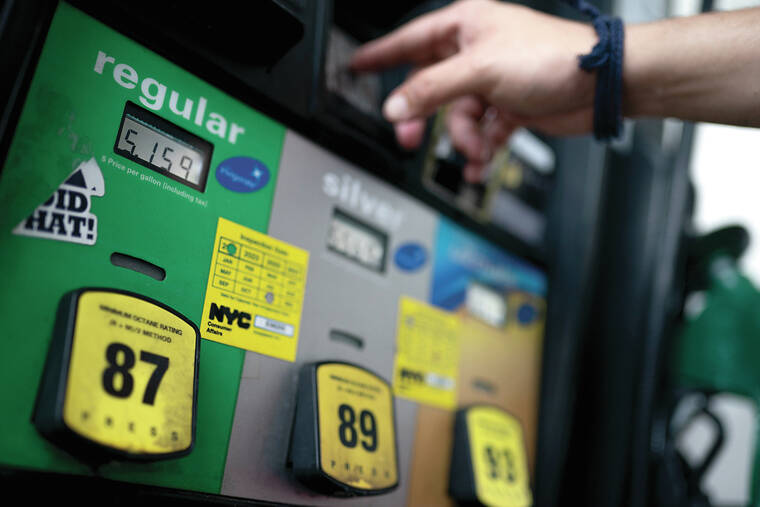Did corporate greed fuel inflation? It’s not biggest culprit
WASHINGTON — Furious about surging prices at the gasoline station and the supermarket, many consumers feel they know just where to cast blame: On greedy companies that relentlessly jack up prices and pocket the profits.
Responding to that sentiment, the Democratic-led House of Representatives last month passed on a party-line vote — most Democrats for, all Republicans against — a bill designed to crack down on alleged price gouging by energy producers.
ADVERTISING
Likewise, Britain last month announced plans to impose a temporary 25% windfall tax on oil and gas company profits and to funnel the proceeds to financially struggling households.
Yet for all the public’s resentment, most economists say corporate price gouging is, at most, one of many causes of runaway inflation — and not the primary one.
“There are much more plausible candidates for what’s going on,” said Jose Azar an economist at Spain’s University of Navarra.
They include: Supply disruptions at factories, ports and freight yards. Worker shortages. President Joe Biden’s enormous pandemic aid program. COVID 19-caused shutdowns in China. Russia’s invasion of Ukraine. And, not least, a Federal Reserve that kept interest rates ultra-low longer than experts say it should have.
Most of all, though, economists say resurgent spending by consumers and governments drove inflation up.
The blame game is, if anything, intensifying after the U.S. government reported that inflation hit 8.6% in May from a year earlier, the biggest price spike since 1981.
To fight inflation, the Fed is now belatedly tightening credit aggressively. On June 15, it raised its benchmark short-term rate by three-quarters of a point — its largest hike since 1994 — and signaled that more large rate hikes are coming. The Fed hopes to achieve a notoriously difficult “soft landing” — slowing growth enough to curb inflation without causing the economy to slide into recession.
For years, inflation had remained at or below the Fed’s 2% annual target, even while unemployment sank to a half-century low. But when the economy rebounded from the pandemic recession with startling speed and strength, the U.S. consumer price index rose steadily — from a 2.6% year-over-year increase in March 2021 to last month’s four-decade high.
For a while at least — before profit margins at S&P 500 companies dipped early this year — the inflation surge coincided with swelling corporate earnings. It was easy for consumers to connect the dots: Companies, it seemed, were engaged in price-gouging. This wasn’t just inflation. It was greedflation.
Asked to name the culprits behind the spike in gasoline prices, 72% of the 1,055 Americans polled in late April and early May by the Washington Post and George Mason University’s Schar School of Policy and Government blamed profit-seeking corporations, more than the share who pointed to Russia’s war against Ukraine (69%) or Biden (58%) or pandemic disruptions (58%). And the verdict was bipartisan: 86% of Democrats and 52% of Republicans blamed corporations for inflated gas prices.
“It’s very natural for consumers to see prices rising and get angry about it and then look for someone to blame,” said Christopher Conlon, an economist at New York University’s Stern School of Business who studies corporate competition. “You and I don’t get to set prices at the supermarket, the gas station or the car dealership. So people naturally blame corporations, since those are the ones they see raising prices.”
Yet Conlon and many other economists are reluctant to indict — or to favor punishing — Corporate America. When the University of Chicago’s Booth School of Business asked economists this month whether they’d support a law to bar big companies from selling their goods or services at an “unconscionably excessive price” during a market shock, 65% said no. Only 5% backed the idea.
Just what combination of factors is most responsible for causing prices to soar “is still an open question,” economist Azar acknowledges. COVID-19 and its aftermath have made it hard to assess the state of the economy. Today’s economists have no experience analyzing the financial aftermath of a pandemic.
Policymakers and analysts have been repeatedly blindsided by the path the economy has taken since COVID struck in March 2020: They didn’t expect the swift recovery from the downturn, fueled by vast government spending and record-low rates engineered by the Fed and other central banks. Then they were slow to recognize the gathering threat of high inflation pressures, dismissing them at first as merely a temporary consequence of supply disruptions.
One aspect of the economy, though, is undisputed: A wave of mergers in recent decades has killed or shrunk competition among airlines, banks, meatpacking companies and many other industries. That consolidation has given the surviving companies the leverage to demand price cuts from suppliers, to hold down workers’ pay and to pass on higher costs to customers who don’t have much choice but to pay up.
Researchers at the Federal Reserve Bank of Boston have found that less competition made it easier for companies to pass along higher costs to customers, calling it an “amplifying factor” in the resurgence of inflation.


